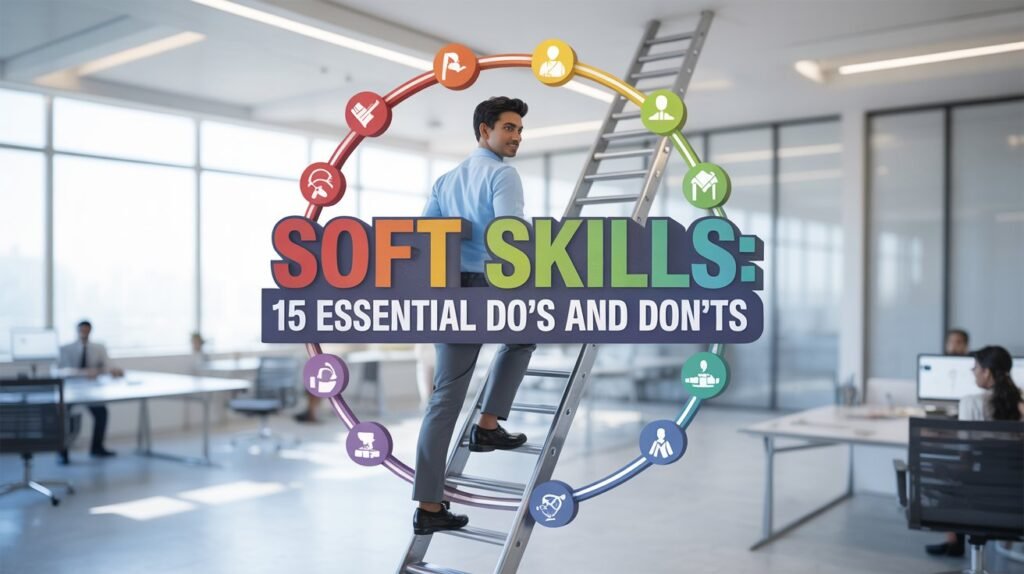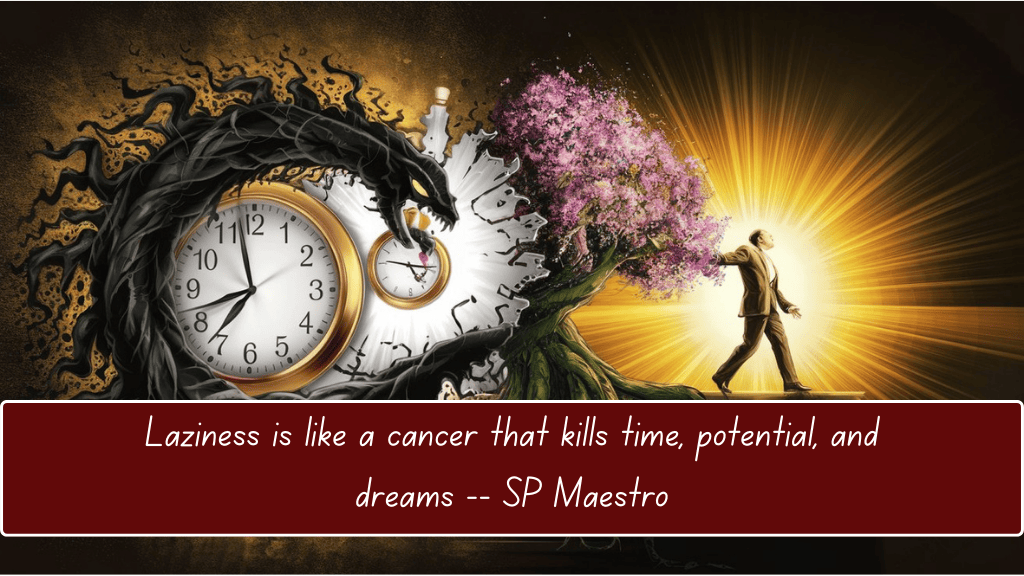Introduction: Why Soft Skills Matter More Than Ever
In today’s competitive workplace, technical expertise alone won’t guarantee career advancement. The professionals who truly excel are those who master the art of soft skills – the interpersonal abilities that enable effective communication, leadership, and collaboration.
Whether you’re a recent graduate or a seasoned professional, understanding the fundamental do’s and don’ts of soft skills can be the difference between stagnation and extraordinary success.
The Foundation: Core Soft Skills Every Professional Needs
1. Work Ethic: The Cornerstone of Professional Success

Do: Work hard without having to be asked and without complaint. Don’t: Think this is about hours – outcomes matter most of all.
Your work ethic speaks volumes before you even say a word. Employers notice those who consistently deliver quality results without constant supervision.
2. Growth Mindset: Embracing Continuous Learning
Do: Welcome feedback, embrace learning, and incorporate both. Don’t: Think you know everything.
The most successful professionals view challenges as opportunities to grow. They actively seek feedback and use it to improve their performance.
Communication: The Bridge to Professional Relationships
3. Professional Communication Skills

Do: Speak and write simply and clearly. Don’t: Use complex language, bury your point, or ramble.
Clear communication eliminates confusion and builds trust. Every email, presentation, and conversation is an opportunity to demonstrate your professionalism.
4. Active Listening: The Undervalued Skill
Do: Listen to hear, respond, and validate what people say. Don’t: Forget the importance of body language.
Active listening involves more than just hearing words. It requires full engagement, appropriate responses, and non-verbal cues that show you’re present.
Emotional Intelligence: The Secret Weapon
5. Self-Awareness: Know Yourself to Lead Others

Do: Understand how others perceive your words and actions. Don’t: Fail to self-reflect or think you’re above critique.
Self-aware professionals can read the room, adjust their approach, and build stronger relationships with colleagues.
6. Emotional Intelligence in Action
Do: Learn to identify emotions and control your responses. Don’t: Fail to pause when heated.
Emotional intelligence separates good employees from great leaders. It’s about managing your emotions while understanding others’.
Reliability and Trust: Building Your Professional Reputation
7. Reliability: Your Professional Currency
Do: What you say you will do by when you say you will do it. Don’t: Break promises.
Reliability builds trust, and trust is the foundation of all professional relationships. Consistent follow-through on commitments establishes your reputation as dependable.
8. Professionalism: Your 24/7 Brand

Do: Build trust by speaking and acting maturely at all times. Don’t: Assume you can cross the line in more relaxed settings.
Professionalism isn’t a switch you turn on and off. It’s a consistent way of being that builds respect and opens doors.
Time Management and Organization
9. Time Management Mastery
Do: Prioritize and be organized, so you stay on top of your work. Don’t: Allow distractions to steal your attention and waste time.
Effective time management isn’t about being busy – it’s about being productive. Focus on high-impact activities that drive results.
10. Motivation: The Internal Drive
Do: Get going on projects quickly and without being asked. Don’t: Require constant hand-holding or encouragement.
Self-motivated professionals are invaluable to organizations. They identify opportunities, take initiative, and drive projects forward independently.
Adaptability and Resilience
11. Adaptability: Thriving in Change

Do: Rethink your plan when you gain new information. Don’t: Fail to make adjustments after setbacks.
The modern workplace changes rapidly. Professionals who adapt quickly and help others navigate change become indispensable.
12. Resilience: Bouncing Back Stronger
Do: Rethink your plan when you gain new information. Don’t: Fail to make adjustments after setbacks.
Resilient professionals don’t just survive challenges – they learn from them and emerge stronger. They view setbacks as setup for comebacks.
Interpersonal Skills: Building Winning Relationships
13. Collegiality: The Art of Collaboration
Do: Be easy to work with. Don’t: Think this means being a pushover – you can still be you.
Collegial professionals contribute to positive team dynamics while maintaining their authenticity and professional standards.
14. People Reading: The Subtle Art

Do: Watch the reactions, body language, and mood of others. Don’t: Fail to ask people if you’re unsure how they’re feeling.
Understanding non-verbal communication helps you navigate complex workplace dynamics and build stronger relationships.
15. Collaboration and Integrity: The Final Pillars
Collaboration Do: Work well with other people, sharing ideas and credit. Collaboration Don’t: Think you’d be better off on your own.
Integrity Do: Be honest and ethical, whether or not others will know. Integrity Don’t: Think you can hide things.
These final soft skills form the ethical foundation of professional excellence. They build the trust and respect that sustain long-term career success.
Implementing Soft Skills for Career Transformation

Start with Self-Assessment
Before developing new soft skills, honestly evaluate your current abilities. Ask trusted colleagues for feedback and identify areas for improvement.
Practice Consistently
Soft skills develop through consistent practice. Choose one or two areas to focus on initially, then gradually expand your skillset.
Seek Feedback Regularly
Regular feedback helps you understand how others perceive your soft skills and where you can improve.
The ROI of Soft Skills Development
Investing in soft skills yields significant returns:
- Career Advancement: Professionals with strong soft skills are more likely to be promoted
- Salary Increases: Studies show soft skills can increase earning potential by 15-20%
- Job Security: Soft skills are harder to automate, making professionals more valuable
- Workplace Satisfaction: Better relationships lead to higher job satisfaction
FAQs
A: The most important soft skills include communication, emotional intelligence, work ethic, reliability, and adaptability. These form the foundation for professional success across all industries.
A: Soft skills development is an ongoing process. While you can see improvements in 30-60 days with consistent practice, mastery takes months to years of dedicated effort.
A: Yes, soft skills can be measured through 360-degree feedback, behavioral assessments, and performance reviews that evaluate interpersonal effectiveness and professional behaviors.
A: Both are essential. Technical skills get you hired, but soft skills help you advance, lead teams, and build lasting career success. The most successful professionals excel in both areas.
A: Start with self-assessment, seek feedback, practice consistently, observe successful professionals, and consider formal training or coaching programs focused on soft skills development.
Conclusion: Your Soft Skills Success Journey Starts Now
Mastering soft skills isn’t just about following rules – it’s about developing the interpersonal abilities that make you indispensable in any workplace. These 15 do’s and don’ts provide a roadmap for professional transformation.
Remember, soft skills development is a journey, not a destination. Start with one or two areas, practice consistently, and watch as your career prospects expand dramatically.
The professionals who thrive in tomorrow’s workplace will be those who combine technical expertise with exceptional soft skills. Your journey to career excellence starts with implementing these fundamental principles today.
Other Interesting Content you ay like
-
Neuroplasticity: 5 Steps to Rewire Your Brain for Success
-
Which Utensil is Healthiest for Eating? Complete Guide to 9 Utensils and Their Health Effects
-
18 Laws of Human Nature: Ultimate Guide to Decode People Like a Pro
-
His Holiness Beloved SP Maestro MahaaGURU Ji Invited as Special Guest for Hanuman Chalisa Meditation in London
-
1600+ Days of Continuous Yagnas and Counting: An Ongoing Mission for Global Harmony
-
Journey of His Holiness Beloved SP Maestro MahaaGURU Ji
-
Free Medical Camp Serves 150 Residents in Ramalakshmana Pally
-
What Are Mudras? 7 Sacred Hand Positions That Powerfully Transform Your Well-Being
-
7 Rules for Charisma: Proven Secrets to Become Magnetic in Any Room
-
Healing the Inner Child: 4 Powerful Trauma Types & Affirmations to Transform Your Life
Our other websites for more spiritual insight
Explore Inspiring Spiritual Websites
Aumaujaya.org
A spiritual website filled with inspiring content to help you deepen your understanding of mindfulness and living in the present. Explore their teachings to enrich your journey toward inner peace.
Visit Website →Auysa.org
A platform dedicated to motivating and uplifting the spirit of youth. If you’re looking for ways to inspire younger generations to embrace the present, this is a fantastic resource.
Visit Website →Shreeprabhu.org
A spiritual website with inspiring content centered around the idea of “Universal Oneness.” Their teachings align beautifully with the art of being present and finding happiness in every moment.
Visit Website →


